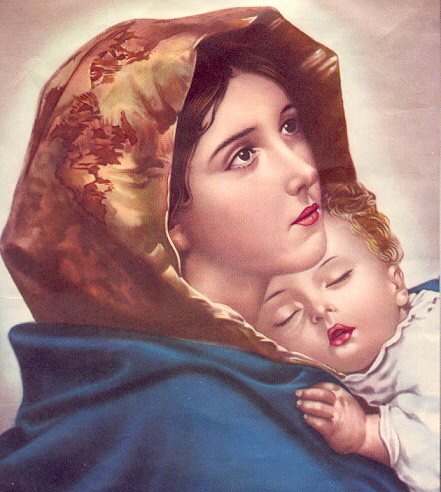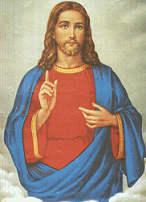|

Organizations

Life of Jesus
Bible
|
Home
 The true translation The true translation
of the Lord’s Prayer
The Lord's Prayer (also called Our Father) is a central prayer in Christianity. In the New Testament according to the Holy Bible, it appears in two forms: in the Gospel of Matthew 6:9–13, as part of the discourse on ostentation in the Sermon on the Mount, and in the Gospel of Luke, which records Jesus being approached by "one of His disciples" with a request to teach them "to pray as John taught his disciples." Luke 11:1–4.
According to the Aramaic/Syriac Peshitta, the prayer concludes with "For Yours is the kingdom, the power, and the glory, forever and ever." in Matthew, and with "Let us not into temptation but deliver us from the evil one." in Luke. The liturgical form is Matthean.
English versions
There are several different English translations of the Lord's Prayer from Greek or Latin, beginning around AD 650 with the Northumbrian translation. Of those in current liturgical use, the three best-known are:
• The translation in the 1662 Anglican Book of Common Prayer (BCP) of the Church of England
• The slightly modernized form used in the Catholic mass and (along with the doxology) in the 1928 version of the Prayer Book of the Episcopal Church in the United States of America
• The 1988 translation of the ecumenical English Language Liturgical Consultation (ELLC)
The Anglican Book of Common Prayer adds the doxology in some services but not in all. Older English translations of the Bible, based on late Byzantine Greek manuscripts, included it, but it is excluded in critical editions of the New Testament, such as that of the United Bible Societies.
The Catholic Church has never attached doxology to the Lord's Prayer, but has included it in the Roman Rite Mass as revised in 1969, not as part of the Our Father but separated from it by a prayer called the embolism spoken or sung by the priest.
|
Catholic (without doxology) and 1928
Anglican (with doxology)
Our Father who art in heaven,
hallowed be thy name.
Thy kingdom come.
Thy will be done
on earth as it is in heaven.
Give us this day our daily bread,
and forgive us our trespasses,
as we forgive those who trespass against us,
and lead us not into temptation,
but deliver us from evil.
[The 1928 BCP adds:
For thine is the kingdom,
and the power, and the glory,
for ever and ever.]
Amen.
|
1662
Anglican BCP
Our
Father, which art in heaven,
hallowed be
thy name;
thy kingdom
come;
thy will be
done,
in earth as
it is in heaven.
Give us this
day our daily bread.
And forgive
us our trespasses,
as we
forgive them that trespass against us.
And lead us
not into temptation;
but deliver
us from evil.
[For thine
is the kingdom,
the power,
and the glory,
for ever and
ever.]
Amen.
|
1988 ELLC
Our Father in heaven,
hallowed be your name,
your kingdom come,
your will be done,
on earth as in heaven.
Give us today our daily bread.
Forgive us our sins
as we forgive those who sin against us.
Save us from the time of trial
and deliver us from evil.
[For the kingdom, the power, and the glory are yours
now and forever.] Amen.
|
Though Matthew 6:12 uses the term debts, the older English versions of the Lord's Prayer uses the term
trespasses, while ecumenical versions often use the term sins.
As early as the third century, Origen of Alexandria used the word trespasses (παραπτώματα) in the prayer. Though the Latin form that was traditionally used in Western Europe has
debita (debts), most English-speaking Christians (except Scottish Presbyterians and some others of the Reformed tradition), use trespasses. The Established Presbyterian Church of Scotland, the Church of Christ, Scientist, as well as the Congregational denomination follow the version found in Matthew 6 in the Authorized Version (known also as the King James Version), which in the prayer uses the words "debts" and "debtors".
All these versions are based on the text in Matthew, rather than Luke, of the prayer given by Jesus.
Aramaic version
The Lord's Prayer survives in the Aramaic language in the form given to it in the Syriac Peshitta version of the New Testament. In Aramaic original language there is no mentioned of the word
trespasses or trespassed neither the word “lead us not into temptation” but
debts and debtors and “let us not into temptation” and the deference is quite huge, since God never leading the man into temptation but delivers him from it, see James 1:13-14.
The Syriac provides a telling clue as to
the original wording Jesus was likely to have used, in His own
Palestinian Aramaic dialect.
The translation of the Lord’s Prayer according to the gospels of Matthew and Luke in Aramaic/Syriac language is as following:
|
The prayer as it is written in Aramaic
form in Matthew 6:9–13.
ܐܰܒ݂ܽܘܢ ܕ݁ܒ݂ܰܫܡܰܝܳܐ
ܢܶܬ݂ܩܰܕ݁ܰܫ ܫܡܳܟ݂:
ܬ݁ܺܐܬ݂ܶܐ ܡܰܠܟ݁ܽܘܬ݂ܳܟ݂:
ܢܶܗܘܶܐ ܨܶܒ݂ܝܳܢܳܟ݂ ܐܰܝܟܰ݁ܢܳܐ ܕ݂ܒ݂ܰܫܡܰܝܳܐ ܐܳܦ݂ ܒܰ݁ܐܪܥܳܐ:
ܗܰܒ݂ܠܰܢ ܠܰܚܡܳܐ ܕ݂ܣܽܘܢܩܳܢܰܢ ܝܰܘܡܳܢܳܐ:
ܘܰܫܒ݂ܽܘܩ ܠܰܢ ܚܰܘܒܰ݁ܝ̈ܢ ܘܰܚܛܳܗܰܝ̈ܢ:
ܐܰܝܟܰ݁ܢܳܐ ܕ݂ܳܐܦ݂ ܚܢܰܢ ܫܒ݂ܰܩܢ ܠܚܰܝܳܒ݂ܰܝ̈ܢ:
ܠܳܐ ܬ݂ܰܥܠܰܢ ܠܢܶܣܝܽܘܢܳܐ:
ܐܶܠܳܐ ܦ݂ܰܨܳܢ ܡܶܢ ܒܺ݁ܝܫܳܐ:
ܡܶܛܠ ܕ݁ܕ݂ܺܝܠܳܟ݂ ܗ̱ܺܝ ܡܰܠܟ݁ܽܘܬ݂ܳܐ:
ܘܚܰܝܠܳܐ ܘܬ݂ܶܫܒܽ݁ܘܚܬܳ݁ܐ:
ܠܥܳܠܰܡ ܥܳܠܡܺܝܢ ܀
|
The translated prayer as it occurs in
Matthew 6:9–13.
Our Father Who is in heaven
Holy be Your Name, Your kingdom come, Your will be done on earth as it is [also] in heaven. Give us this day our daily (our needed, Lit.) bread, and forgive us our debts and sins as we also have forgiven our debtors.
Let us not into temptation but deliver us from the evil one.
For Yours is the kingdom, the power, and the glory, forever and
ever.
|
The prayer as it is written in Aramaic
form in Luke 11:2–4
ܐܰܒ݂ܽܘܢ ܕ݁ܒ݂ܰܫܡܰܝܳܐ
ܢܶܬ݂ܩܰܕ݁ܰܫ ܫܡܳܟ݂:
ܬ݁ܺܐܬ݂ܶܐ ܡܰܠܟ݁ܽܘܬ݂ܳܟ݂:
ܢܶܗܘܶܐ ܨܶܒ݂ܝܳܢܳܟ݂ ܐܰܝܟ݂ ܕ݂ܒ݂ܰܫܡܰܝܳܐ ܐܳܦ݂ ܒܰ݁ܐܪܥܳܐ:
ܗܰܒ݂ܠܰܢ ܠܰܚܡܳܐ ܕ݂ܣܽܘܢܩܳܢܰܢ ܟ݁ܽܠܝܽܘܡ:
ܘܰܫܒ݂ܽܘܩ ܠܰܢ ܚܛܳܗܰܝ̈ܢ:
ܐܳܦ݂ ܚܢܰܢ ܓ݁ܶܝܪ ܫܒ݂ܰܩܢ ܠܟ݂ܽܠ ܕ݁ܚܰܝܳܒܺܝܢ ܠܰܢ:
ܘܠܳܐ ܬ݂ܰܥܠܰܢ ܠܢܶܣܝܽܘܢܳܐ:
ܐܶܠܳܐ ܦ݂ܪܽܘܩܰܝܢ ܡܶܢ ܒܺ݁ܝܫܳܐ ܀
|
The translated prayer as it occurs in
Luke 11:2–4
Our Father Who is in heaven
Holy be Your Name, Your kingdom come, Your will be done on earth as it is also in heaven.
Give us every day our daily bread, and forgive us our sins we also have forgiven our all debtors. Let us not into temptation but deliver us from the evil one.
|
We urge our Syriac Orthodox Churches to use their original Aramaic/Syriac version which is the original language of the lord and not copying the other translations, the English translation of the Aramaic language is:
Lord’s Prayer
Translated according to the Aramaic/Syriac
Our Father Who is in heaven, holy be Your Name, Your kingdom come, Your will be done on earth as it is in heaven. Give us this day our daily bread, and forgive us our debts and sins as we have forgiven our debtors. Let us not into temptation but deliver us from the evil one. For Yours is the kingdom, the power, and the glory, forever and ever, Amen.
Our Father Who art in heaven
Hallowed be Thy Name, Thy kingdom come, Thy will be done on earth as it is in heaven. Give us this day our daily bread, and forgive us our debts and sins as we have forgiven our debtors. Let us not into temptation but deliver us from the evil one. For Thine is the kingdom, the power, and the glory, forever and ever, Amen.
Print the
Lord's Prayer
|